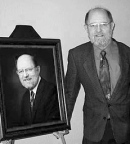I’d anticipated writing a cheery post this week about Saturday’s trip to Dauphin, a small city about four hours northwest of Winnipeg. I was quite sure there would be something interesting to share — about the drive up, perhaps, or the afternoon reading I was doing at the Dauphin Public Library together with aboriginal writer Niigaanwewidam James Sinclair or the planned tour of the Ukrainian Orthodox Church or dinner and lodging with friends.
But, unless I write fiction, there’ll be none of that. We didn’t go. All the highways to our destination were closed because of severe icy conditions, so there we sat Saturday morning just outside Winnipeg, which was as far as we’d been able to drive, making phone calls, making our decision to turn around (not a real decision, though, since there was no option but to cancel) and feeling disappointment seep into our spirits.
We took care of some Christmas shopping instead and then H. and I returned home to work on projects. In the evening we saw the fabulous movie Life of Pi. I’m not queuing for sympathy, seriously — at least no more than is commensurate with the situation — for we were safe and we’re hoping the reading event will be re-scheduled.
But it was the weirdest feeling, the rest of that grey day and the next morning, like a sad memory. Now and then the reminder of what I’d been intending to do at that moment but wasn’t doing would sweep over me. How could it be a memory then, when it hadn’t happened?
But perhaps the sensation of disappointment resembles memory because of how intensely it relates to expectations. Expectations have a strong existence. They may be about the future, but they create something quite firm within us, which unravels just as palpably when not fulfilled. Something new has to be created because of what didn’t happen, and that’s work. We have to find stories or other scenarios to comfort ourselves in the loss (such as, it would have been no fun sliding into the ditch) or explanations that help us move on (such as, life in Manitoba is simply unpredictable in winter). It means filling the space that disappointment has opened (such as, let’s go to a movie).
I’m making these observations from this comparatively small disappointment, but I happened to be in my 2007 journal recently and encountered one much larger. That year, at meetings in Fresno, California, I had a conversation with Dr. Allen Guenther at MB Biblical Seminary, whom I’d known earlier from both Toronto and Winnipeg. He’d joined the seminary quite a few years earlier but his teaching was cut short because of a long struggle with Parkinson’s disease.
I asked him how he was.
“Limping,” he said. (It hurt him to walk.)
We talked about various things and then he said, “I would never have thought this is how my life would turn out.”
And he wasn’t at peace with it either, he went on, nor did he think he should be, for “not at peace” was itself a search for meaning and significance. He didn’t speak these things with bitterness, but there was certainly disappointment and certainly honesty about the work required in response to disappointment. I know too that he was doing this work well. He formed a support group for fellow Parkinson’s sufferers, for example, calling it his “new parish.” Fellow seminary professor Elmer Martens wrote, in a tribute, that Guenther’s “perseverance, his faith in God, his transparency in tough times… filled [us] with awe.” (Allen Guenther died in December 2009, age 71.)
The season of Advent, which we’ve just entered, is described as a time of waiting. It’s also a time in which we recognize the reality of despair in ourselves and the world. In a sermon we heard Sunday, R. Niebuhr was quoted as saying that despair is experienced when people can’t imagine God’s promised alternative future. But surely the failure of imagination grows out of times of disappointment over expectations that were once imagined but unfulfilled. Advent allows us to ask, How long, O Lord, should we keep forming new expectations?
It’s a limping alright, disappointment is. It hurts and it makes us work. In the midst of working and waiting, we ask for hope. It helps to remember this as well, that God loved Jacob, who limped.


Yeah, disappointment. Great theme to reflect on. It is easy and glib to say that something better comes in place of the disappointment but that is not always the case. I think we should, however, continue to create new expectations as long as we have breath.
Thanks Al, and I agree, as long as we have breath.
Thank you for this, Dora. I spent part of this afternoon with someone who has grown used to limping. Still hoping, but limping nonetheless.
And thanks for stopping by here too, Ryan.
I liked your comparison of memory and disappointment; how they both relate to expectations. I’ve experienced that recently as I trace my roots, first in Paraguay and then in Ukraine. Things were very different from how I remembered/expected/ envisioned them to be. Sometimes that was disappointing, sometimes enlightening, sometimes bewildering!
I agree with you, the movie “Life of Pi” was fabulous!
If I understand you correctly, you mean your visits to these places, that is, expectations about places based on memories? Not just the disappointments that those events in your family’s journeys entailed, but adjustments in the content. Please correct me if I’ve misunderstood you! A layering!
Note to readers: Elfrieda is posting about her visit to Poland and Ukraine and working through memories and events related to them at her blog “In Transit” http://ens-intransit.blogspot.ca/
Yes, I mean my having to adjust my own expectations when I revisited a place I remembered or thought I knew from what I heard my parents tell about it. It was just so different from what I had expected!